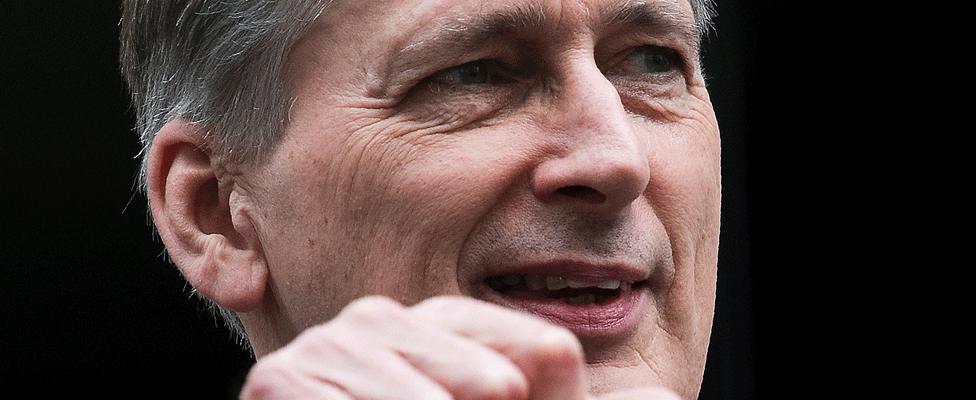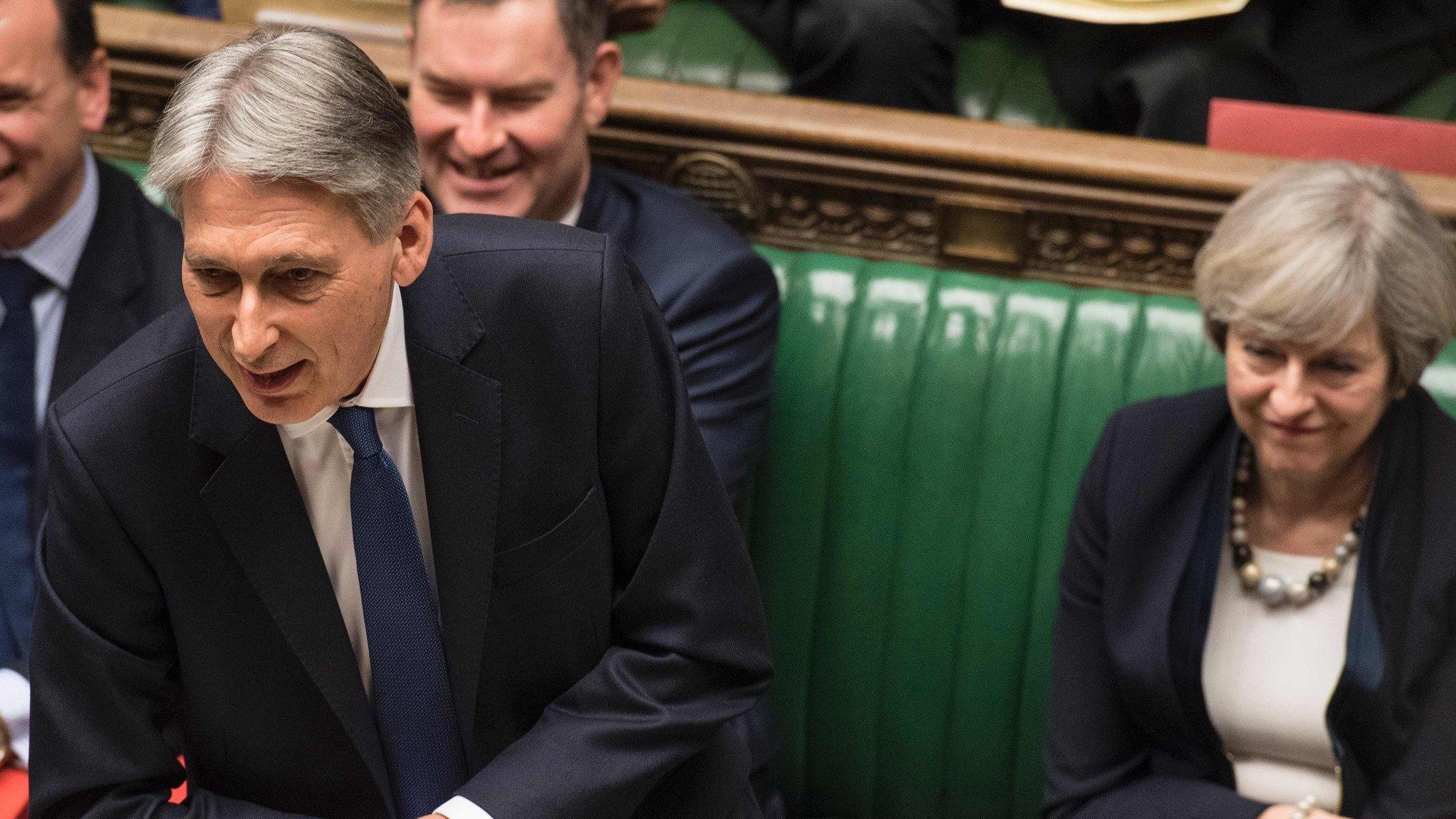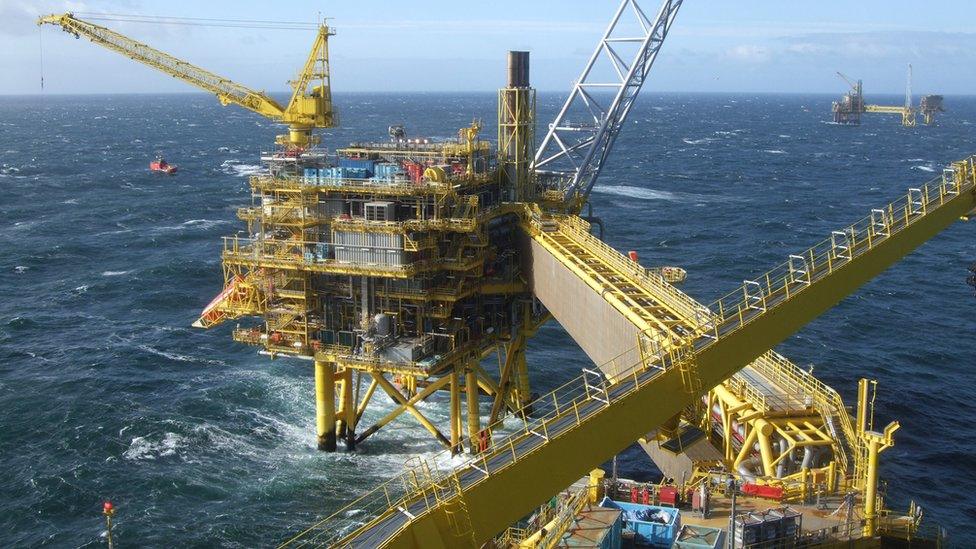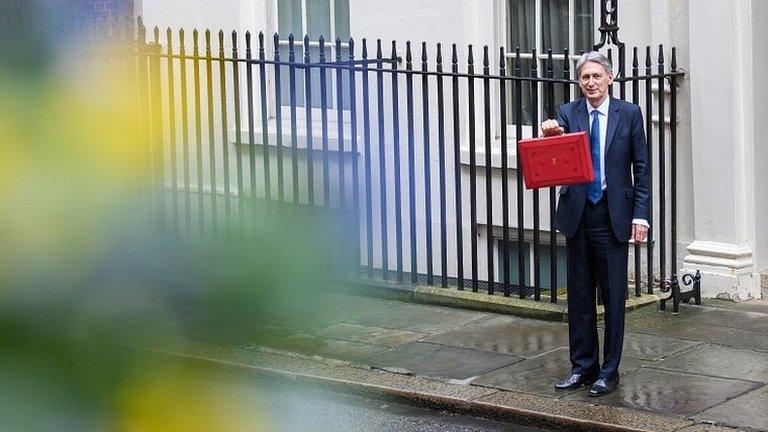Budget measures 'worth £350m' to Scotland
- Published
- comments
Chancellor Philip Hammond announces £350m in additional funding for Scotland in his Spring budget
The Scottish government will receive a £350m funding boost as a result of measures announced in his budget, the chancellor has said.
The additional Barnett formula money will come from increased UK government spending on areas such as education.
Mr Hammond told the House of Commons that the additional funding demonstrated that "we are stronger together in this great United Kingdom".
He also confirmed additional help for the North Sea oil and gas industry.
The Treasury said the Scottish government would see its resource budget boosted by £260m over the next three years, and its capital budget by £90m over the period to 2021.
It said the money would be in addition to the £800m of additional Barnett funds announced by the chancellor in last year's Autumn Statement.
The Scottish government said the "limited increases" in Barnett consequentials meant the Scottish budget was still facing cuts of £2.9bn over the next decade.
Its finance secretary, Derek Mackay, said: "The real elephant in the room in this budget was Brexit. There was no mention of the UK government's plans to protect and grow the UK economy as the prime minister gets ready to trigger Article 50.
"This is simply not acceptable. Brexit is a real threat to people across Scotland in so many ways. The chancellor must tell us his plans."
But Mr Hammond insisted his budget would "equip our economy and our people for the future - while dealing with the challenges we face as one nation".
He added: "Benefitting from £350m of extra investment, the Scottish government can take further steps to strengthen Scotland's economy and make sure that Scottish people, of all background and no matter where they live, feel the benefits of economic growth."
The Barnett formula is used to calculate public expenditure allocated to the devolved nations.
The additional money will largely be the result of increased UK government spending in social care, health and education in England - but the Scottish government will be free to spend it however it wants.
The chancellor also confirmed that a panel of experts would be set up to examine how to boost sales of late life oil and gas fields - so they can keep producing for longer.

Analysis
By BBC Scotland political editor Brian Taylor

The SNP benches proved stubbornly immune to Phil the Funster. He announced that there would be £350m extra for the Scottish government to spend.
There then followed a showbiz moment: the Tories cheered and the chancellor grinned broadly while repeatedly gesturing towards the SNP benches, inviting them to join in the general hilarity.
The Nationalists, entirely understandably, declined to participate, sitting silent upon a peak in Darien or, rather, upon their benches in the Commons.
Both at Westminster and Holyrood, the SNP subsequently noted that the cash available, while welcome, was spread over three years and failed to compensate wholly for what they said were more substantial reductions over the past ten years.
There was precious little jollity, either, surrounding the issue of oil. The chancellor announced a review of North Sea taxation in an effort to bolster this late phase in the history of the black, black oil.
Scottish ministers say action is needed - rather than a further review.

The Treasury said "good progress" was being being made towards a City Deal with Edinburgh, while negotiations on a City Deal for Stirling have been opened.
And it said the UK government was also "looking forward" to considering proposals for a Tay Cities Deal in the near future.
Mr Hammond opened his budget statement by saying that, although the UK economy "continued to confound the commentators with robust growth", the UK's deficit was still high, and productivity "stubbornly low".
He also said the Office for Budget Responsibility had revised up its growth forecasts from 1.4% to 2% for 2017, and that borrowing would be £16.8bn lower than previously forecast.
The chancellor also announced an increase in National Insurance rates for self-employed people, saying the disparity with the amount paid by employees "undermines the fairness of our tax system".
What are opposition parties saying?
Class 4 National Insurance contributions will go up to 10% from 9% and to 11% in April 2019, he told MPs.
Scottish Labour leader Kezia Dugdale said: "This was billed as a budget that would be upbeat but what we got instead was an insight into the devastating impact a chaotic Tory Brexit will have on families across the UK.
"The Chancellor could have brought an end to seven years of damaging Tory austerity but instead he doubled down by imposing cuts to public services and welfare".
Scottish Greens co-convener Patrick Harvie said: "The £350m in capital funds coming to the Scottish government is a drop in the ocean after years of cuts, but it's vital that Scottish ministers use this cash to invest in the kind of physical and social infrastructure we really need."
- Published8 March 2017
- Published8 March 2017

- Published8 March 2017

- Published8 March 2017
